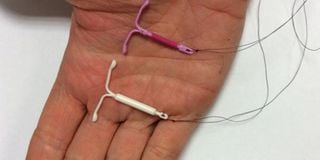Prime
A case for IUDs

What you need to know:
- The copper IUD is said to be suitable for most women especially those that want a non-hormonal method. It lasts a long time and is non-permanent. It has no effect on one’s menstrual cycle.
- A smelly discharge, lower abdominal pain, pain during intercourse, and a high temperature are probable signs of an infection.
We have covered some information about the copper intrauterine device (IUD) and in this article we will look into a little more to cover areas not tackled. According to http://www.ouh.nhs.uk/patient-guide/leaflets/files/11489Pcopper.pdf, the device is not suitable for pregnant women, those with an untreated sexually transmitted infection, those whose wombs are a different shape from the normal, those with unexplained vaginal bleeding, and those with very heavy, and/or painful periods.
It is said one’s periods may become heavier, longer or more painful with the copper IUD although this is described as slight and might go unnoticed. If it is an issue, there is another available device called intrauterine system (IUS). It is said there is a small chance of infections in the first 20 days after fitting.
This might be because bacteria occurring normally in the vagina are pushed up to the womb during the fitting process. If there is a sexually transmitted infection in the vagina, this too could be pushed up into the womb.
There could also be some sort of discomfort throughout the menstrual cycle and during intimacy. If unbearable, a smaller device could be fitted or one with a different shape.
A smelly discharge, lower abdominal pain, pain during intercourse, and a high temperature are probable signs of an infection. And should these appear after the copper device is fitted, then one needs to go and see their gynaecologist. This is the same case if one suspects they are pregnant or have actually had a positive pregnancy test.
It could be that the device has slipped out of place or perhaps fallen out. It is advised that one uses protection or abstains from sex until they have an appointment with the doctor.
It is advised that those that want to conceive take vitamin D and folic acid supplements three months before one tries for the baby. It is said one’s natural fertility will return immediately after the device is removed.
The copper IUD is said to be suitable for most women especially those that want a non-hormonal method. It lasts a long time and is non-permanent. It has no effect on one’s menstrual cycle.
The author is a pharmacist




